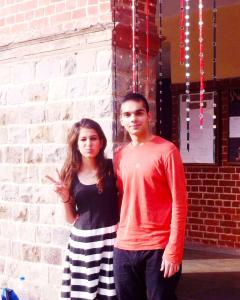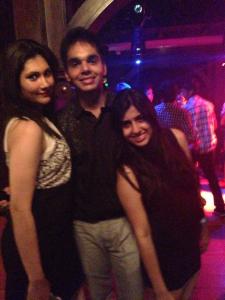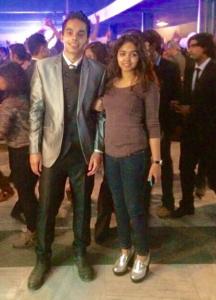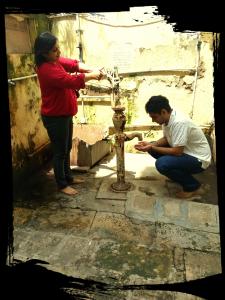The Boy Wonder - II
A lovestruck Vasu's prayers bound off the corners of heavens and divine help arrives in the unlikely form of Narad Muni, the well-meaning sage who roams the realms and spreads mischief with a higher purpose in mind.
The Boy Wonder - II
by sanaryamni‘He never came back. Nobody ever saw him again. He was presumed killed’, daddy replied.
‘And what happened to the others?’
‘Do you really want to hear?’
The little boy nodded, his eyes half shut with sleep. So his father told him the tale he’d heard from his own father.
Ψ
As suspected by Amar singh, the Muslims waited only for the award of The Border Commission to be announced. On 29th July 1947, the day it was declared that Gujranwala was to come to Pakistan, all hell broke loose.
Narain never returned from Chajjoke. They never saw Shabbo again either. For that matter no Muslim servant ever turned up at the house again for work. A terrified Preeto, huddling her three little girls close remained imprisoned in her own house, its emptiness tormenting her. Narain’s wife remained numb, distant and detached. She performed like a mechanical robot pinched of any hope or sorrow. No more British convoys were returning from the area. They’d cut the telephone and electric lines to her house. Thankfully they had plenty of water to drink from the stepwell. She depended on the odd well-wisher and the Murphy radio to give her news about the holocaust that was spreading like the pestilence till it consumed everything around them.
Preeto’s last hope remained the train that was to come from Pind Dadan Khan on the 7th of Asuj (September). This was to be the last train between Pakistan and India to ferry refugees. She decided to board it with her flock, or whatever that remained of it.
The train arrived at Kamoke station at 8 am on the 8th of Asuj. Preeto and her family had been taken to the station in the munshi’s Tonga; he figured he owed it to them. At the station, after a teary farewell the munshi hastened back to the safety of his home.
The passengers who’d already travelled for more than 24 hours in the train were hungry as well as thirsty. They had not been given any water, and no hawker on the stations where the train had stopped was allowed to sell any foodstuffs to them. There were 5000 people on board the train that included 600- 700 women. At about 10 AM the train gave out a long whistle, signaling the passengers to clamber aboard as it was leaving. The relieved passengers boarded the train but the train never moved. Meanwhile a huge mob of armed Muslims shouting ya Ali appeared from the side of the Mandi and the factories. They began to run towards the train. The mob entered the coaches and began to butcher the men and children systematically, sparing no one. Only the women were spared. The armed police on the platform shot down panicked passengers who climbed down from the train and tried to run away. The military present on the station also pretended to fire to dispel the mob, but they were only firing in the air.
Only the women were left alive. They were brought down to the platform and later sorted out. Old women, including Preeto were killed on the spot- her three little girls having already been speared when they were still clinging to her on her bosom. The lame Chattru had been shot dead in his seat. Lajwanti, Narain’s bride, was taken away. As she was being led outside the station by an exultant marassi (folk singer), an Inspector, mesmerized by her beauty stopped the man. He ordered his men to bundle her inside his jeep instead. A middle-aged widower with several children, the Inspector brought her to his own home.
The other women were also similarly distributed among the rioters as booty of war. They were abused and exploited and defiled and made to do menial jobs as well as work in other people’s houses for wages.
A month later, it was announced by drumbeats that a contingent of the Indian military had arrived to take back any Indian women or children that remained in the area. All citizens were advised to immediately hand over all Hindu Sikh women and children to the SHO at Mandi Kamoke police station. About 150 women and children came to be gathered at the police station by dusk. The SHO, Nawaz Sharif, himself a proud claimant of having murdered more than 50 kafirs by his own hand, gathered them around him and began to address them. ‘ The Indian military is here to take you to India. But be warned, Mahatma Gandhi has said that there is no food in India! India is a poor country. He wants you to stay wherever you are. This is your home, who will you go to in India? Who do you have there? It’s a strange land with poverty, famine, and a cruel caste system. They don’t respect women the way we do- they beat them and drive them like slaves and use them only for sexual pleasure. They murder females even when they are in the womb. Just imagine what will happen to you. Now you have a loving man, a caring family here. You’ve lived here all your lives. The Hindus did much worse to our people in the rest of India, don’t you worry. What had to happen has happened. The madness is over now. Your children have been adopted and converted to a better faith that makes no distinctions. You are welcome to spend the rest of your lives with us; you are our esteemed guests and family members. You are one of us now! Tell me, how many want to go to that dusty, dirty, swine eating land of the kafirs?’
Out of 150 women only 20 got up and said they wanted to leave. A magistrate recorded the proceedings in front of the Indian military captain and took thumb impressions of all the women and children present. Amar Singh had paid heavy bribes to ensure Lajwanti received his letter asking her to come back with the Indian military. He had carefully given directions on how she would find him in India. She was the last surviving member of his family and he desperately wanted to bring her back.
The inspector who had brought her home, sat watching from a distance, twirling his fingers through his henna dyed long beard. Lajwanti, who had squatted on the floor with the other women glanced across at her him. She could make out his kindly smile through the thick orange beard. She moved a hand softly over her belly that was slowly growing rounder with the Inspector’s child. She crumpled Amar Singh’s letter that had been handed over to her by an Indian soldier and tossed it away. She was going to be the sole heir and claimant to Sardar Amar Singh’s extensive properties and businesses.
Lajwanti made up her mind and decided to stay back in Pakistan.
She put her thumb impression on the paper the magistrate placed before her on the desk, and without looking the Indian captain in the eye, strolled out with the Inspector.
Ψ
Vasu was already asleep by the time his daddy finished the story of Mandi Kamoke. But the story lingered in his dreams. He dreamt of flying huge kites from the rooftops of his sprawling farmhouse in Pakistan. He imagined jumping from roof to roof to catch freely floating kites whose strings had been cut in kite battles. He felt he’d been there to clamber down the steep stepwell and take a bath in its cool sheet of blue water. He imagined the cool wind in his face as the Arabian horses raced on the sandy track by the canal with the red water. He dreamt of Muslim servants chasing him in the vast compound with his food, begging him for Allah’s sake to have it before it went cold.
‘Mummy says we should forget bad things as soon as possible because they pull us down and make us feel low. Why don’t you forget the Mandi Kamoke days daddy?’ Vasu asked his father one day while strolling through the bazaar.
‘They were not bad days for me, son. They were the best part of my life. I want to cling to those stories till my last breath. Of course, I don’t want to remember the last part- about the leaving. And as for you, I tell you those stories because we should know who we are and where we come from. It helps us understand ourselves and our destinies better.’
Vasu and daddy were inseparable. After the usual nightly ritual of love making, when Paro would finally let Vasu clamber aboard the bed, he slept tummy down on his father’s chest. When daddy returned home he would ignore everybody till he had found Vasu, lifted him high above his head and given him a few pieces of candy. If Vasu were still out playing he would go to the cricket ground and bring the protesting boy home on his shoulders. Only after he’d played with Vasu and listened to his childish tales of the day to his heart’s content that he would first go and hug his wife, and then cuddle his daughter. Lastly, he always had dinner with his grandmother and siblings after having had a tot or two of cheap army rum.
As the boy grew up the bond between father and son only grew fonder and stronger. Vasu never had to ask for anything. Daddy brought him things even before he realized he needed them- like that membership for the public library… or that vastly unaffordable tennis coaching.
The boy had developed a voracious appetite for reading. His frequent spells of fever as a sickly child had forced him to remain indoors mostly. And what else could a boy do inside a room without computers or Wi-Fi or mobiles or video games or even TV, except read? He read everything that came his way, old newspapers that wrapped parcels of groceries, sundry user manuals, and even his father’s promotion-exams books! He had already devoured Paro’s textbooks, and she was only three years elder to him. Daddy, tired of spending his bonuses on books that were read and done with before the night was over, decided to instead invest in a lifelong membership in a public library to quench the boy’s insatiable thirst for reading. After a few stumbling initial steps, Vasu took to reading and learning like a fish to swimming or like a little birdie to soaring on the winds. His family never stopped him from anything. Keen that he should grow stronger and faster so that he would overcome the initial handicaps of being a premature child, he was allowed to be the last boy home from cricket ground, to climb like a monkey across people’s rooftops, which were joined those days, to swing from the tallest trees or to throw down Jamuns for Paro to catch, and to remain outdoors for as long as he wished if he was not on medications or in any pain. His spindly bowlegs soon straightened up and became supple and strong. His puny frame filled out and soon he caught up with boys of his age, and then some more. He came from a handsome line of ancestors and the inherited good looks, so far hidden under a sallow complexion and frail façade, soon began to assert themselves.
By the time Vasu was in 9th grade, and Paro was in the 12th, and his father had been deceased for a whole year, the boy was already ahead of his class, writing poetry and penning short stories, and representing school in the cricket and tennis teams.
His father unfortunately had not lived long enough to see his son turning out so handsomely- both physically and cerebrally. Six months after they’d brought him to the hospital after his fall, he’d succumbed to infections in the surgical wounds. And with him had died the stories of Mandi Kamoke. And with him had ended Vasu’s innocence. Mummy was inconsolable initially, but her deep religious faith, her stoic calm, and her worldly obligations soon returned her from the comfort of lamenting to the more pressing business of raising two fast growing children demanding attention all the time.
She decided it was time to face her mother in law.
‘This letter has come from his office’, she said, clutching the torn yellow envelope with official markings, avoiding referring to Vasu’s late father directly, out of respect, as was the custom.
Grandma didn’t reach out for the letter- she couldn’t read. ‘Well, does it say something?’
‘They have offered a compassionate employment for one dependent unmarried family member.’
Grandma looked up with interest. Her eldest son, Inderpal stopped tinkering with the radio he was trying to fix. He was the eldest after Daddy, and unemployed. Jobs in those days were few and far between. There was hardly any private industry and even the humblest government jobs could only be had through tough competitive exams.
‘I want Paro to take this job,’ Mummy said.’ the only problem is…’ her voice trailed off.
‘What is the problem? Is she underage? She is 18 already isn’t she?’
‘The minimum qualification is High School pass. And you know Paro is still two semesters away from her final exams.’
Grandma obviously had no clue. ‘So?’
‘I spoke to the neighbors- you know from F-53- the husband who works in the bank. They said I could apply for a delay for one year since Paro is graduating. Would Inderpal come with me to the office to file an appeal? I don’t know much about these things. But getting a job for Paro would put the family back on our feet. She is already of marriageable age. It’s a big burden on a widow. And with a job I can find a good groom for her- maybe from a good, well-off family.’
Grandma gave one scorching look to Inderpal who was about to say yes. It sent him scurrying back to the crusty old resistor that he was trying to replace. Grandma knew more about being a widow than anyone in town. Sold off in marriage by her parents to an already married man, elder even to her poverty-stricken milkman father whose cattle had died on him during the great famine, she knew all about second places. She’d been there all her life. Her rustic survival instincts sharpened by a lifetime of struggle and near-starvation had thus far helped her stand her ground and keep her flock enduring despite odds that would have overwhelmed persons of lesser mettle. She knew Paro was no meek lamb like her dear departed son who would place the monthly salary in her lap every month. She would never see another penny of it.
‘Never trust a Jhangi Multani,’ she retorted, referring to the neighbors from F-53. ‘The nonsense they will vex your ears with! Delay by a year- my Jutti! Is the government a platform that will wait for my train to arrive? Why can’t Inderpal here take that job?’ she snatched the envelope from mummy and gave it to Inderpal to read.
The skinny, effeminate man adjusted his bifocals and darting a look furtively from his sister in law to his grisly mother began to read aloud from the letter, putting a shaky finger on each word. ‘It says any dependent, adult, unmarried member’, he said finally, folding the letter back into the envelope and reaching it over to mummy.
‘Are you eligible or not’, grandma asked, snatching the envelope from her son and peering inside it.
The man looked nervously from one woman to another and twiddled the knob on the old machine in his lap, sending out a howling tweet that knocked his darned socks off. ‘Yes’, he managed to whisper.
‘It’s done then. After Vasu’s father, Inderpal here is the man of the house. I need to find a match for him too- he’s not getting any younger here’, grandma said, looking at her flaccid tendril with grim satisfaction- she knew he was never going to marry, and till she breathed her last, her till would jingle with the wage-coins that fell in her lap.
‘But…’ mummy tried to protest.
‘Don’t worry; I have set something aside for Paro’s marriage. Let her study for now’, grandma retorted, and dismissed mummy.
Poor Inderpal took the job meant for Paro. Till the day he retired he remained paranoid about his office colleagues laughing behind his back, and conspiring to do him in by the most enduring and painful of tortures for stealing from a widow- his own brother’s widow.
Mummy wrung her hands in despair for days after that, beating her brow for letting grandma in on the office letter. But prayer steeled her heart yet again and she forgot and she forgave and she came to the happy conclusion that god with his mysterious ways must have meant only the best for her daughter. He knows best, she said, smothering worries and fears with the sweet fumes of holy incense on her prayer thali.
Mummy decided to pay her brothers a visit. Last she’d seen them was at Daddy’s funeral. Before that they’d come just after the death of their last surviving parent, their mother, to get her signatures on an affidavit surrendering all her claims to the family assets and money in favor of her brothers. She was happy to be of help. She was grateful that they’d come at all. Had they sent the papers by the postman’s hand she would have as happily signed them. She never asked for anything in return, even though she herself lived in a dire state and her parents had many factories, large houses, and plenty of money. She accepted without murmur the Hindu custom of leaving the girls out of inheritance once they’d been married off. She doted on her brothers even though they hardly came by to check on her. Daddy and her brothers had never got along. They always looked down upon daddy as a humble clerk whereas they were rich businessmen who travelled abroad and had an Ambassador car and hobnobbed with big officials and film stars.
Vasu often wondered why a prosperous family would marry their daughter into a struggling, refugee family at all. But then Sardar Amar Singh’s name had carried a lot of weight, and they’d expected his known business acumen to bring about a sharp reversal to the family fortunes. Alas, he died suddenly and unexpectedly, not really able to shake himself out of mourning for his glorious past. His failing eyes had never quite got accustomed to the daylight, after the blackness they’d seen under that British army blanket BD that concealed them in the back of the rickety army truck during the flight from Pakistan.
Mummy visited her brothers after a lot of fanfare. She bought her kids new clothes from the weekly street bazaar and scrubbed them a shiny clean. She packed a couple of clothes for all of them for two to three days- she expected her brothers to force her to stay back for a few days at least. She didn’t know what exactly she wanted from them; she left it to them to figure it out. The only One before whom she spread her hands to ask or beg, usually for others, not herself, was the four-armed deity with the dark complexion of water-filled clouds. Yes, she was a staunch devotee of Lord Vishnu, the preserver.
One fine morning they took the DTC bus till New Rohtak Road. There they jostled with villagers lugging livestock and semi naked sadhus with their chillums and staffs, to squeeze themselves into a Haryana State Roadways bus for the one hour ride to Bahadurgarh, Mummy’s native place. Nobody had come to receive them at the bus station at the end of their tight but enjoyable ride. Enjoyable because this was probably the first vacation outside Delhi they’d had in years.
‘Must be busy’, mummy shrugged, while bundling the sleepy siblings into a rickshaw for the final journey home. She’d already been to the grocer’s and called up her brothers ahead of her arrival.
The rickshaw ploughed ahead with its load on the state highway for a few kilometers till the rubble of the small cranky town gave way to vast open yellow green fields of cotton, mustard, and sugarcane. Then it suddenly and dangerously swung into a wide dusty trail surrounded on both sides with smoke-spewing factories. Had mummy not been holding on to the sleeping Vasu, he would surely have been tossed out like a little bundle onto the highway. Their own house was at the end of the track next to the railway lines beyond which lay the moody Jhajjar River, quiet for most of the year except during the monsoons when it turned into a raging fiend that destroyed crops and washed away livestock and homes without any remorse or mercy. Then, as suddenly as it had awakened, it would become still and sullen again, as if nothing had happened.
The sun had sunk behind the tall corn crops rustling in the wind when they arrived at Vasu’s maternal home. The kids were already asleep. After waking them briefly to eat something, mummy put them to bed in her departed mother’s room that no one used now. Then she chatted with her sisters in law and waited for her brothers to arrive from work.
They greeted her warily when they reached.
‘So how are you sister’, the brothers asked, hugging her.
‘Fine’, she replied, gushing like a little girl.
‘Aren’t the kids here,’ Teja, the elder one asked.
‘They’re asleep’.
‘Did you manage just fine on the journey’? Kesho, the younger one said, fixing a drink for himself and Teja.
‘Kids are grown up now. They can look after themselves’, she said with pride.
‘Why did you bother, we could have come over?’
‘I had been meaning to consult you on so many things. You know, you people are all I’ve got now’.
‘Sure sister’, Kesho patted her hand. ‘These are hard times, we’re pretty tight with the money ourselves’.
‘I haven’t come to ask for money, though I don’t seem to have any’, she tittered, as if it was a silly thought.
‘Then’, Kesho asked guardedly.
‘You know the house…it makes no sense to stay there. To get to the kitchen or the toilet the kids have to go round half the colony to enter from the backdoor’.
‘Why? Isn’t there a passage via the rooms?’
‘Yeah, but grandma and my brothers in law live in those rooms. When Vasu’s daddy was alive they used to keep it open, at least for most part of the day. Now they have just shut us out’.
‘I knew she was one cheap trick when I saw her! She’s base, she’s mother in law from hell!
‘No… she’s not that bad. Rather than fight the situation I thought it would be good to give the kids some open space to breathe in. and some company to play with.’
‘I see what you mean. Do you have a good house in mind to take on rent then? We could send somebody from the factory to help you shift.’
Mummy laughed again, her lame brothers were just not picking the cues. ‘Like I just said, I have no money! Though I do expect the pension to kick in any time. Chaps from office came by to the house for the paperwork. I guess I’ll get some gratuity too, and insurance and his accumulated provident fund. I’d like to save that for Paro’s marriage and Vasu’s higher education- you know, with DwarkaDhish’s blessings, the kid’s shining in school- studies as well as sports!’
‘Then…what were you thinking’, Kesho asked, exchanging curious looks with his brother.
Mummy waved her hands expansively about her.’ I meant this. This is the house of my parents; this is where I grew up. I want to give the children the same break that I got. To live breathe play and study in these vast open spaces, to experience the freedom of the wild countryside the way I did!’
‘You would bring the kids from a place like Delhi to this back of the beyond wilderness, this abandoned, backward, rural scrapyard?’
‘I would, at least it has an attached kitchen! And enough privacy for a grown up lass to bathe with dignity!’
‘And what about us? Where do we go?’
‘There’s enough room for everybody! I would stay in the mom-dad portion; you carry on staying in this part. And I won’t be a burden, I have my pension and a little bit saved up’.
The brothers exchanged looks again. Kesho rose; a little unsteady with the drink, to his feet. ‘What kind of brothers would we be, to remove a sister from the house of her husband, her rightful home, and put her in a destitute state in the home of her parents, to snatch her identity, her place, and condemn her to spend her days in solitude and anonymity. What would society say, what would the world call us, how will god judge us; heartless wretches that wrecked the happy home of their own blood, their kid sister?’
‘They would probably thank you, if they were in their right mind, all of them’. Mummy, used to the lofty speeches her brother made under the influence, giggled.
‘Banish such nonsense from the mind. Over my dead body will my sister be marooned in this island surrounded by rustic fools! We ourselves are contemplating a move to Delhi, lock, stock, and barrel, dear sister. If we continue in this place any further, out children will turn into babbling yokels, fit for nothing but feeding chickens. They be chasin’ ‘em bicycle tires all day with ‘em twigs, hangin’ from trees, playin’ marbles and speakin’ in a god-awful dialect that beats the crap outta us. An’ they be failing their class and pullin’ pranks on people that make ‘em call us the freak show from ‘em Russian’s Circus.’
‘Really, where in Delhi?’
‘We checked out this big house on New Rohtak Road…it’s cool. It’s close enough to Nangloi, where we’re setting up the new factories, and far enough from this place- give the kids a chance to imbibe some of the city manners and get a bit of that sophistication’.
‘Great, then we’ll be close by!’
‘Yeah. You could come by…say once in a year. And we could come look you up…say once in a couple?’
‘Oh’, mummy said, trying not to scowl.
‘Let’s turn in then, sister. You haven’t seen our factory at Nangloi yet, have you? We’ll show you and the kids around first thing in the morning then’.
‘The kids could see it later, they’re tired’.
‘Oh, they’ll love it, trust me’, Kesho said. ‘And then we could take you home and have that word with Biji regarding the kitchen…and toilet it was, wasn’t it?’
‘Kesho, I was hoping the kids could spend some time here with your families. They hardly have any friends back home. And I want them to find out about their relatives- it’s high time they came out of that isolation. That’s how we planned it- around their Christmas vacations. They’ve been looking forward to it, for days, I promised them!’
Kesho was speechless for a while. He looked to his brother for support.
‘Oh, so you didn’t know, is it?’ Teja spoke.
‘What, is there a problem?’
‘Yeah, there is a big problem! My sister comes with her kids, and she doesn’t even know that our families are leaving town!’
‘Really? Where? When?’
‘Mine are going to Agra. And Kesho’s are going to Jagraon! Didn’t we tell you?’
‘No. Surprisingly you never made a mention of it when I called you up’.
‘You wouldn’t have asked me! Oh, what a mess! Fine, we’ll ask them not to go, what say brother?’ Teja glanced at his brother.
Kesho shrugged. ‘They’ll kill me. But it’s fine!’
Mom rose to her feet. ‘Don’t bother! I should have clarified. It’ll be a big help if you took us back to Delhi’.
‘That we can, that we can’, both brothers chanted in unison. ‘But please, think again, stay some’.
‘Another time’, she said, sorry for her kids.
‘All right, we’ll let you know when we shift to Delhi. Maybe we’ll see more of each other. I really want these brats to learn some manners from your kids. Be good for them’.
‘Good night’ she said and picked up a lantern to find her way to her kid’s beds.
She decided not to visit the Nangloi factory. What was the point? It was clear her children, though legitimate heirs, were not part of the destiny her brothers were carving out for themselves. She would only feel bitter, and she did not like to feel bitter, it made her miserable, and it spoiled the day, sometimes days. She ground her hopes for the day under the shoe and crept into the quilt with her softly snoring children. The kids were still asleep when at 6 AM they were bundled into the car and delivered home, still dressed in the finery of the street bazaar and their bag packed intact.
When Vasu woke up, rubbing his eyes, he couldn’t believe he was still in his old house. He thought he’d been through a dream, tightly packed in a rickety bus with little calves, saffron-robed sadhus and chain-smoking villagers dressed in brightly colored costumes, travelling to Bahadurgarh for a week’s vacation. When he looked down and saw he was still wearing his new clothes he knew he’d been cheated of a dream.
‘Mummy, why didn’t we go to Bahadurgarh’, he rushed out wailing.
She was bent over, spreading mulch around the Belas, Chamelis, and the Mogras, which were a riot of colors and fragrances at this time of the year. She turned and hugged the shaking boy.
‘We went there, baby. But they were leaving to meet their own relatives, and your uncles were very busy with the new factories they’re setting up. So there was nothing for us to do there, there would have been nobody there but us.’
‘But why? Didn’t you tell them we were coming?’
‘Yes, sweetheart, but grownups sometimes make sudden plans. Don’t you think it’s better we all have each other here for the holidays?’
‘No its not! I hate you! And I miss daddy’, the boy retorted, barely able to hold back his tears and stormed back inside the room.
Mummy knew how to placate her child; hot sugary milk ladled with thick cream and Gajar Ka Halwa (carrot pie). A couple of boys stopped outside the house and hollered for Vasu to come out and play cricket with them. Vasu hastily changed into his white rig, and after hugging his mother ran out into the sunlit park for the game. By the time he came home for a hurried lunch, only to rush out again, he’d forgotten all about Bahadurgarh. But his mother hadn’t.
Ψ
More from sanaryamni
In Quest of a Tiger
by sanaryamni
A girl's quest for the elusive lord of the jungle turns out to be a damp squib.
The Boy Wonder - V
by sanaryamni
Vasu learns what girls are like.
- Jul, 29 2015
- Erotic Realistic Fiction
The Boy WOnder - III
by sanaryamni
Vasu battles the misfortunes of a underpriveleged childhood to win Padma, his consort.
- Jul, 21 2015
- Fable Heavy Drama
The Boy Wonder - I
by sanaryamni
A meek boy, put down long enough by the wily competition, prays for superpowers when the girl he loves is about to be lost to a casanova boss.
- Jul, 12 2015
- Heavy Drama Tragedy
The Boy WOnder - IV
by sanaryamni
Vasu's mummy seeks divine aid to recompense for the suffering her innocent daughter undergoes at the hands of the rich old lech, Lalaji.
- Jul, 23 2015
- Crime Heavy Drama
Coward's Siege
by sanaryamni
Coward is besieged by strange trespassers in the dead of the night.
- Dec, 1 2016
- Comedy Experimental







.jpg)